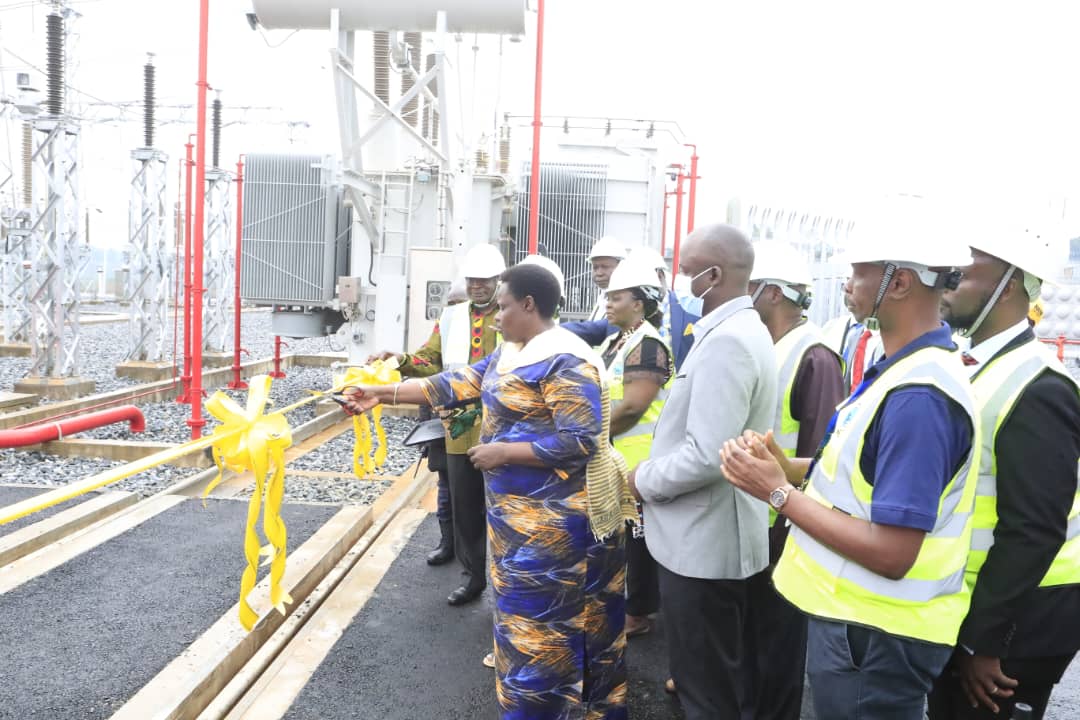
By Emmanuel Okol
Vice President Maj. (Rtd) Jessica Alupo yesterday switched on the 132kV/33kV Arua power Substation to reinforce the electricity supply to the West Nile region.
Last Saturday, President Yoweri Museveni officially commissioned the Nebbi substation (132KV), which has now culminated in the connection of the West Nile sub-region to the high-voltage national grid.
The 132kV Kole – Gulu – Nebbi – Arua Transmission Line can deliver over 200MW of power to the West Nile. The Nebbi and Arua Substations have been constructed with a capacity of 80MVA each.
While commissioning the project on behalf of President Museveni, Vice President Alupo explained that by connecting the West Nile region to the national grid, it will be possible to evacuate electricity from key power projects, such as Karuma, Agago/Achwa and Nyagak I, and III,” the vice president said.
“This will not only meet the region’s unserved demand; but, also stimulate economic growth, improve livelihoods, and foster industrial development in the region,” Alupo said.
She noted that Energy development is the biggest enabler of industrialization and advanced agricultural production, reducing the cost of doing business in an economy.
Alupo further said that energy availability facilitates the establishment of rural industries, in line with the NRM’s goal of building an integrated and autonomous manufacturing sector, based on locally available raw materials.
“It also helps to preserve the environment, by reducing over-reliance on wood fuel, for domestic purposes like cooking, etc. The NRM government is working tirelessly to increase energy availability and consumption across the Country,” the vice president said.
The vice president noted that when the NRM came to power in 1986, the Country was faced with a serious energy problem, despite our high hydropower potential.
She said the Country had a hydroelectricity generation capacity of 165 megawatts, and only 60 megawatts were being generated. This low electricity generation affected development and in particular, industrialization. In 2005, a decision was taken to invest in power generation to address the problem of low supply.
“With the commissioning of Karuma and Isimba Hydropower Plants, generation capacity is now more than 2,000MW. Uganda is in the preliminary stages of developing its Nuclear Energy Programme. We need nuclear energy for peaceful application, in health, trade, agriculture, and power generation. Government has commenced the development of 8400MWe of nuclear energy in Buyende District,” Alupo said.
She noted that the current hydropower generation capacity will be outstripped by increasing demand by 2028, only 5 years from now. She added, “Electricity will not be adequate for the manufacturing industries, at that time. Therefore, the government is scaling up investments in new generation capacity, because of the increasing industrialization”.
The vice president told the people of Arua that electricity transmission capacity has also increased from 3,500 km to 4,218 km of high voltage, in 2019/20.
“Government is fast-tracking transmission lines to load centers, such as mining and industrial parks. There are efforts to intensify distribution, to support the implementation of the Parish Development Model,” she said.
Alupo called upon the leaders to mobilize the people, to exploit this opportunity for reliable power supply, to produce goods and services, in the four sectors of Commercial Agriculture, Industries, Services, and ICT.
“The necessary socio-economic infrastructure to spur Uganda’s transformation, from a predominantly peasant society to a modern economy, has been put in place. Uganda boasts of tarmacked roads, from border to border, enough electricity supply, an ICT backbone,” the vice president said.
She said that to achieve a total transformation of society, this infrastructure must be utilized to create jobs and wealth for households. Poverty, in Uganda, is caused by the fact that 38% of the households are still trapped in subsistence farming.
“This is dangerous in the modern era, where all goods and services needed to sustain life must be bought with money. Development is a collective good for everyone; but wealth and jobs belong to individuals, families, groups, or companies,” she said.
She asked the leaders to help our people with enterprise selection in the four sectors above, to guarantee the profitability of their businesses.
The Kole-Gulu-Nebbi-Arua 132kv transmission line is financed by the World Bank and the government of Uganda to reinforce supply to the West Nile region as well as connect the West Nile region and to the national grid.
Ruth Nankabirwa, the minister of Energy and Mineral Development, explained that the project’s development objective is to increase the availability and efficiency of bulk electricity supply in the project area.
She emphasized that this will enable the evacuation of electricity from the Karuma, Agago/ Achwa, Nyagak 1, and 111 power projects to meet the region’s unserved demand.
She thanked all the stakeholders, especially the Development Partners, and the World Bank, for their support towards the successful completion of this project.
Geoffrey Feta, the chairperson of the West Nile Parliamentary Caucus and Ayivu East Member of Parliament in Arua City this’s a fundamental change in the history of West Nile with stable and industrially reliable electricity. He urged the government to extend this power to the local beneficiary at the grassroots